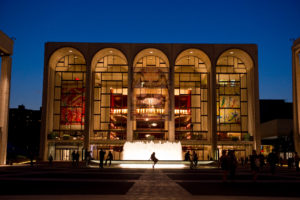
Editorial: The Importance of the Metropolitan Opera Restructuring The Schedules For Future Seasons
By David SalazarThe news that the Metropolitan Opera would be starting to present operas on Sunday afternoons came as a massive surprise for a number of reasons.
On the one hand, the Met has never done this and has retained a rather conservative approach to its scheduling throughout its history. This, of course, is the result of the company working with a number of massive unions, all of them with different interests that often conflict with one another to an extent that made it impossible for such a massive enterprise to make progress. After all, we are not too far removed from testy negotiations that threatened the start of the season.
Necessity
But here we are. And without hyperbole, this might, when all is said and done, wind up being General Manager Peter Gelb’s shining moment from his Met tenure. This could be his masterpiece. What comes up first when the history books look back on his time at the head of the United States’ premiere opera company. To date, Gelb’s tenure has been a mixed bag artistically, with his Live in HD series his crowning achievement. But to suddenly alter the company’s schedule in this way is quite an achievement that literally no one has accomplished before.
Now let’s not pretend that this is a revolutionary move at large. For the company it undeniably is, but for the industry it isn’t. Many opera companies feature performances on Sunday afternoon, simply because it makes a ton of sense. Families spend leisure time on the weekend and Sunday is one day when people like to take time to do something fun like go to the theater or to a movie. Broadway has made a fortune off putting on performances throughout the weekend and for years, people clamored over the Met doing the same (including yours truly). Why not give people the option to attend the opera when so many shows are sold out precisely because EVERYONE wants to go to the theater or to a musical?
Sunday performances should and will help the Met’s box office intake, which, per the NY Times, only took in 67 percent of its potential box office revenue. Sunday’s are among the top grossing days for Broadway shows, movie theaters, and other kinds of entertainment, so it stands to reason that the Met is due for better revenue on Sunday, as opposed to mid-week performances when people would rather stay home to get some much needed rest from work. Who knows just how great the difference will be over the long haul, but this should be an improvement financially.
Of course, the plan is being rolled out progressively; per the NY Times, the first season of Sunday performances will feature 17 Sunday shows. Mondays will then turn into days off for the company. That number of Sunday performances, will grow progressively from season to season.
Mid-Season Break
Which brings us to the other unique switch of the schedule, which will start in 2020 – the mid-season break in February, when the company notes that less people attend the opera.
This is a bigger risk, particularly as it means extending the season into June. Obviously, many companies operate in this manner to great success, but the Met never has and it will put the creativity of the seasons’ programmers to the test to bring audiences back after a few weeks hiatus; right now the company has a fluid season that never stops, giving opera lovers a consistent stream of works and performances to attend.
What is also interesting about this switch has nothing to do with the Met itself, but the opera landscape that circulates around it, particularly in New York. Over the last few summers, the New York Opera Festival has started to fill that gap between the end of the Met’s season in early May and the start of major opera festivals like Glimmerglass in late June / early July. For one month, a number of opera companies put on one of only a few productions they put on all season without having to worry about competing with the big house in Lincoln Center. But with the 2020-21 season and beyond slated to stretch into mid-June, the Met will now overlap with that slot that the NY Opera Fest has taken on. How does that affect the Opera Fest in coming years if it now has to compete with the Met for audience? Does it slide its festival to the vacant February slot, when, per the Met’s statistics, less people are attending the opera?
This also affects the American Ballet Theater, which was appearing at the Met for eight weeks; the company will reportedly continue performing at the Met, but will now trim its time to five weeks.
This is obviously a major shift for the New York opera scene at large. It should be exciting to see how this develops in years to come. The greatest positive to take away from this is that the company, often criticized for being “stuck in its ways,” is willing to take a risk and change things up. This could be the harbinger of more changes to come to the Met in the near future.
Categories
Editorials

